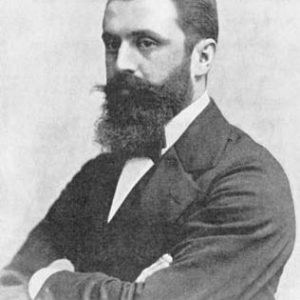 Returning and Redemption
Returning and Redemption
BATH, England- When Theodor Herzl died 100 years ago, at the age of only 44, he was a frustrated man. Since publishing his little book, “The Jewish State,” in 1896, he had tirelessly written, organized and lobbied, but no such state was in sight when a heart attack struck him down.
Did he really believe when he died that a Jewish state would exist within half a century? And could he have guessed that 100 years after his death it would be engaged in a bitter and intractable struggle, which called into question his central argument?
He was a fascinating and attractive man, born in Budapest in 1860 and educated in Vienna, where he worked for the famous newspaper Neue Freie Presse. Herzl’s own life might have been a Jewish success story in 19th-century Europe. Until it all went wrong.
For a time, emancipation and assimilation seemed to have worked, at least outside the czarist empire. But then came a sharply rising tide of anti-Semitism in the last decades of the century.
In Herzl’s Austria, the brilliant anti-Semitic demagogue Karl Lüger was elected mayor of Vienna. And as the Paris correspondent of his paper in 1895, Herzl witnessed the degradation of the falsely convicted Captain Dreyfus in front of a mob shouting “death to the Jews.” This was the “Jewish Question” in acute form.
Months later, Herzl wrote in his diary, “I have the solution to the Jewish Question. I know it sounds mad; and at the beginning I shall be called mad more than once – until the truth of what I am saying is recognized in all its shattering force.”
What he was saying was that the Jews should abandon the pretense of assimilation, recognize their own national identity and build a national state.
This was the germ of “The Jewish State,” and thus was political Zionism born. Herzl spent the rest of his brief life organizing Zionist congresses and traveling to meet the mighty of Europe, from the kaiser to the pope, to promote his plan. He was indeed called mad, or misguided, and his most bitter critics were fellow Jews.
In Herzl’s day most Jews did not accept that such a national state was the natural or proper destiny of their people. At the time Herzl wrote, Zionism had no roots at all in existing Jewish tradition, of which it was, to the contrary, a drastic rejection.
Orthodox rabbis abhorred Zionism for proposing a definition of Jewishness that excluded religious faith and practice. And when the millions of downtrodden Jews of Eastern Europe wanted to escape oppression, it wasn’t to Palestine but to the West that they came, above all to the United States.
Maybe the most penetrating, as well as most fundamental, opposition to Herzl’s scheme came from proud and pious Jews. Zionism supposed that the Jewish people “constitutes a ‘nation’ or might profitably become a nation,” said Claude Montefiore, the president of the Anglo-Jewish Association, “both of which propositions I deny.”
Twenty years after Herzl’s first Zionist congress came the crucial 1917 Balfour Declaration, by which the British government favored a Jewish “national home” in Palestine.
It was fiercely opposed by Edwin Montagu, the only Jew in the British cabinet at the time, and many others like him. Writing to the London Times, Montefiore and David Alexander, head of the Board of Deputies of British Jews, deplored the Declaration. Any such idea of investing the Jews with “rights in excess of those enjoyed by the rest of the population” of Palestine could only “prove a veritable calamity for the Jewish people.” Just over 30 years later, a Jewish state was born, though only after an unimaginably horrible calamity had engulfed the Jews of Europe.
When Israel came into being in 1948, its prime minister, David Ben-Gurion, said that the Jewish people had now become “like other nations.” They would now put behind them their sufferings and leave the pages of history, to become as contented and unimportant as the Danes or the Costa Ricans.
Looking back 100 years after Herzl’s death, the achievement of Zionism has of course been extraordinary. But has it really done what Herzl hoped?
Although very many things can be said about Israel, it is quite obviously not a nation like all others. Far from removing its people from the pages of history, this little Jewish state occupies more of the world’s attention than does India or Africa. And the fact that Israel is the object of so much savage dispute plainly has affected the position of Jews in other lands.
But as anyone can see by visiting Israel, Montefiore and others who disparaged Zionism were wrong in saying that the Jews could not become a nation. That part of Herzl’s dream has come true.
Geoffrey Wheatcroft’s “The Controversy of Zion- Jewish Nationalism, the Jewish State, and the Unresolved Jewish Dilemma,” won an American National Jewish Book Award.